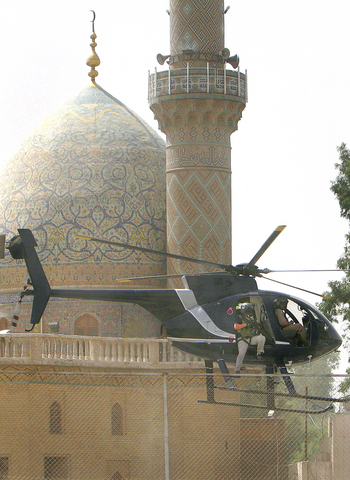A half-dozen armored sport utility vehicles with guns pointed out the windows careen onto Baghdad's busy airport highway, bringing traffic to a screeching halt.
Iraqis have learned to keep a wary distance from the convoys of foreign guns-for-hire in mirrored sunglasses and bulletproof vests, who have a reputation of firing at any vehicle that gets too close because of the ever-present danger of suicide bombers.
Iraqi officials accuse many of the companies providing protection in violence-plagued Iraq of being a law unto themselves, prompting a flurry of attempts to better regulate an industry that is expanding rapidly around the world.

PHOTO: AP
South Africa and Britain are proposing tough new laws governing the participation of their nationals in foreign conflicts. Humanitarian groups are trying to identify gaps in international law. And the industry itself is pushing greater self-regulation.
Iraqi Interior Minister Bayan Jabr, who oversees the activities of private security companies, accuses them of being "militias." Some companies counter that Jabr, who has himself been linked to a private Shiite force accused of widespread abuses against Sunni Muslims, is contributing to the problem by refusing to register security contractors.
Since militaries were slashed at the end of the Cold War, private companies have been a growing presence on the world's battlefields, performing jobs conventional forces can no longer handle. It is a hugely competitive, multibillion-dollar industry, with clients ranging from governments and blue-chip corporations to warlords, drug cartels and terror groups.
In Iraq, at least 20,000 contractors -- local and foreign -- are guarding coalition bases, protecting US officials, training Iraqi security forces and interrogating detainees. They also protect businessmen, journalists and humanitarian workers, among others.
Doug Brooks, head of a US-based association of military contractors, says reports of abuse in the industry are exaggerated.
"In general, companies are using people who are middle-aged ex-military, so they know what they are doing, and they don't make as many mistakes" as the armed forces, he said.
The companies say they recognize the need for regulation in a dangerous industry.
"We would prefer a high level of professionalism across the board. It makes it easier and safer for everybody," said Greg Lagana, spokesman for US-based DynCorp International.
Many top firms have joined associations like Brooks' International Peace Operations Association, which impose stringent human-rights standards on their members. Firms say they also are subject to volumes of legislation.

Kehinde Sanni spends his days smoothing out dents and repainting scratched bumpers in a modest autobody shop in Lagos. He has never left Nigeria, yet he speaks glowingly of Burkina Faso military leader Ibrahim Traore. “Nigeria needs someone like Ibrahim Traore of Burkina Faso. He is doing well for his country,” Sanni said. His admiration is shaped by a steady stream of viral videos, memes and social media posts — many misleading or outright false — portraying Traore as a fearless reformer who defied Western powers and reclaimed his country’s dignity. The Burkinabe strongman swept into power following a coup in September 2022

‘FRAGMENTING’: British politics have for a long time been dominated by the Labor Party and the Tories, but polls suggest that Reform now poses a significant challenge Hard-right upstarts Reform UK snatched a parliamentary seat from British Prime Minister Keir Starmer’s Labor Party yesterday in local elections that dealt a blow to the UK’s two establishment parties. Reform, led by anti-immigrant firebrand Nigel Farage, won the by-election in Runcorn and Helsby in northwest England by just six votes, as it picked up gains in other localities, including one mayoralty. The group’s strong showing continues momentum it built up at last year’s general election and appears to confirm a trend that the UK is entering an era of multi-party politics. “For the movement, for the party it’s a very, very big

ENTERTAINMENT: Rio officials have a history of organizing massive concerts on Copacabana Beach, with Madonna’s show drawing about 1.6 million fans last year Lady Gaga on Saturday night gave a free concert in front of 2 million fans who poured onto Copacabana Beach in Rio de Janeiro for the biggest show of her career. “Tonight, we’re making history... Thank you for making history with me,” Lady Gaga told a screaming crowd. The Mother Monster, as she is known, started the show at about 10:10pm local time with her 2011 song Bloody Mary. Cries of joy rose from the tightly packed fans who sang and danced shoulder-to-shoulder on the vast stretch of sand. Concert organizers said 2.1 million people attended the show. Lady Gaga

SUPPORT: The Australian prime minister promised to back Kyiv against Russia’s invasion, saying: ‘That’s my government’s position. It was yesterday. It still is’ Left-leaning Australian Prime Minister Anthony Albanese yesterday basked in his landslide election win, promising a “disciplined, orderly” government to confront cost-of-living pain and tariff turmoil. People clapped as the 62-year-old and his fiancee, Jodie Haydon, who visited his old inner Sydney haunt, Cafe Italia, surrounded by a crowd of jostling photographers and journalists. Albanese’s Labor Party is on course to win at least 83 seats in the 150-member parliament, partial results showed. Opposition leader Peter Dutton’s conservative Liberal-National coalition had just 38 seats, and other parties 12. Another 17 seats were still in doubt. “We will be a disciplined, orderly